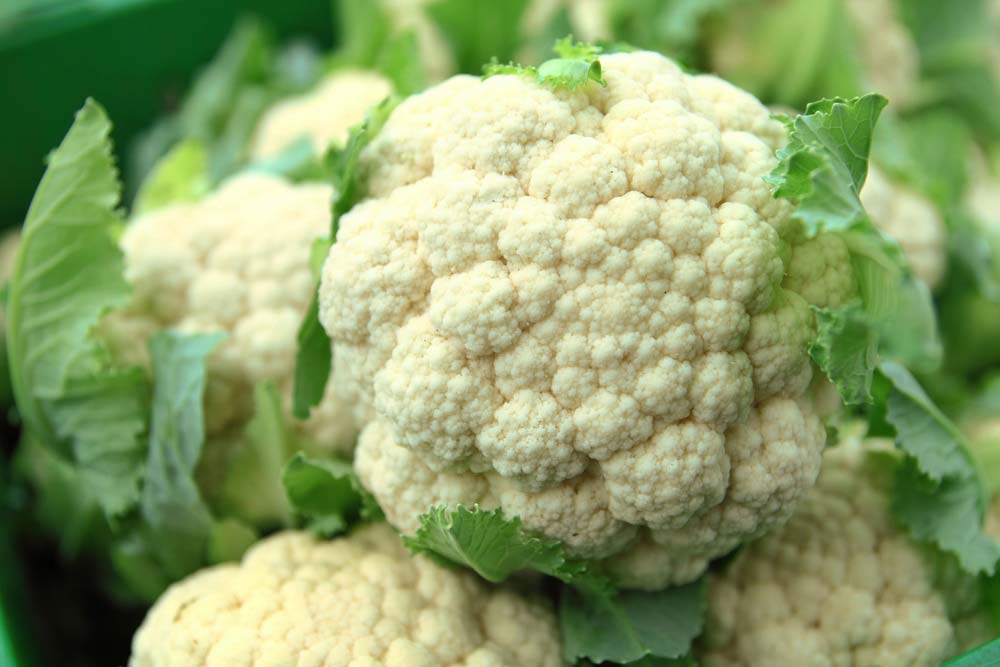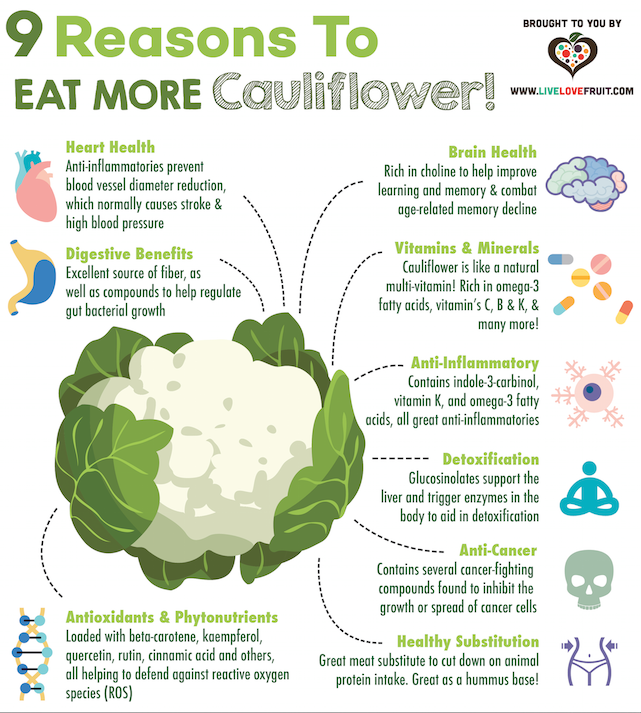The impressive health benefits of cauliflower make it a nutrition
superstar. This heart healthy flowering vegetable offers
anti-inflammatory, digestive, and brain-boosting benefits among so much
more.
The Brassicaceae family is home to a collection of
vegetables known as cruciferous vegetables. All of the members of this
family are widely recognized as healthy foods, with a few ascending to
the status of “super food.” While cauliflower might not be considered a “super food,” it is certainly a healthy dietary choice in its own right.
9 Health Benefits of Cauliflower
Let’s take a look at the 9 health benefits cauliflower has to offer.
It’s a Cancer Fighter
Cauliflower contains several
compounds that have been shown to inhibit the growth or spread of cancer
cells, including sulforaphane, indoles and isothiocyanates. Combining
cauliflower with
turmeric
brings curcumin into the battle, another potential cancer fighter.
Combining cauliflower and turmeric on your plate is also just plain
tasty.
It Contains Anti-Inflammatory Compounds
Nutrients
found in cauliflower, including indole-3-carbinol, have been noted for
their anti-inflammatory properties. The omega-3 fatty acids and vitamin K
found in cauliflower can also help manage the chronic inflammation that
contributes to diseases like arthritis.
It Promotes Heart Health
Those
same anti-inflammatory properties can also aid in preventing against
the inflammation that can exacerbate the decreased diameter of blood
vessels. These conditions, in combination with other factors, can lead
to heart attacks, strokes and high blood pressure.
It’s Packed With Vitamins and Minerals
Cauliflower,
like its cruciferous cousins, is practically a natural multivitamin.
Cauliflower contains B-vitamins, vitamin K, Omega-3 fatty acids,
proteins, phosphorus, potassium, vitamin C and manganese. Take a look at
your multi-vitamin bottle next time — or just have some more
cauliflower.
It Supports Brain Health
Choline has
been shown to improve brain development in youngsters, as well as
learning and memory in brains of all ages. It might also combat
age-related memory decline and help to resist vulnerability to toxins
during childhood. You know what vegetable contains a healthy dose of
choline? Cauliflower, of course.
It Aids Detoxification
The glucosinolates in cauliflower
can support the liver and trigger enzymes in your body to help with
detoxification. The antioxidants and nutrients occurring in cauliflower
also contribute to Phase 1 and Phase 2 detoxification. Cauliflower might
not contain the same amount of glucosinolates as other members of the
crucifer family, but it still has a significant amount.
It Contains Antioxidants and Phytonutrients
Beta-carotene,
kaempferol, quercetin, rutin, cinnamic acid and other antioxidant
compounds can be found in cauliflower. These antioxidant compounds can
help your body’s cells defend against reactive oxygen species (ROS).
Without these chemicals (or other antioxidants), your body is less
effective at fighting the free radicals and toxins that can cause
damage.
It Provides Digestive Benefits
Cauliflower
is a source of dietary fiber, which is an important component of
digestive health. It has also been suggested that sulfurophane and
glucosinolate can help regulate the growth of bacteria in your stomach
and prevent damage to the stomach and intestine linings.
It’s a Substitute for Other, Less Healthy Ingredients
As
impressive as cauliflower is, we should also acknowledge what it isn’t.
Adding cauliflower to a meal in place of pastas or potatoes can limit
your intake of starches, complex carbohydrates and the animal fats that
normally come along with those other foods. Your meals will still fill
you up, but without the empty calories. The possibilities of cauliflower
are endless—you can even use it with pancakes or hummus. Cauliflower
can also be a satisfying meat substitute if you are looking to shed a
few pounds by cutting down on your animal protein intake.



0 Komentar